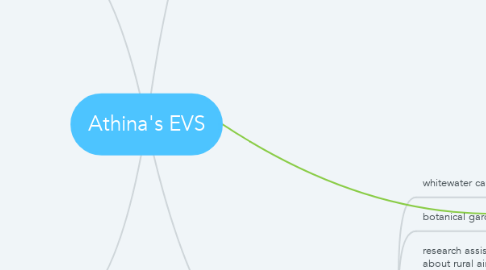Athina's EVS
by Athina Koukopoulos

1. Family
1.1. lots of animals around the house - chickens, ducks, tortoises, dogs, cats, fish
1.2. father grew up in farming family in a village during WWII (conservation of resources is a necessity and common sense - "Who are you to waste water like that?")
1.3. mother is a potter/art teacher (dirt is useful / getting covered in clay slip is normal for babies, right?)
1.4. one brother is a software engineer - probably would describe himself as a technocrat - always on the look out for innovation to improve lives.
1.5. another brother is a police officer - started a PhD in Archaeology and then got fed up with academia and wanted to do something "more immediately useful". A choice that is difficult for me to understand.
1.6. recycling and compost at home is the default
2. Education
2.1. private school where my mother was a teacher - sustainability was presented like a luxury that the wealthy could afford
2.2. community service and charity is how to contribute to society (aka make up for the harm done by me or on my behalf)
2.3. residential summer camp every summer
2.4. study abroad, residential semester schools
2.5. UNC-Chapel Hill opened my eyes to the diversity of experience in North Carolina. I had lived in Charlotte for 14 years and my narrow vision of the state was my affluent school community
3. Work
3.1. whitewater canoeing instructor
3.2. botanical garden intern
3.3. research assistant for Public Health study about rural air pollutants (from factory hog farms on children's health)
3.4. Natural History teacher - outdoor field trips, field science, emphasis on field journal observations
3.5. West Virginia subsitute teacher 1 year - everything from primary maths to high school agricultural sciences - big year of growth for me, not sure what the students got out of it.
3.6. International school teacher - emphasis on correct answers, exam scores and University acceptance
3.7. I make enough money that I can worry about what kind of biodegradable laundry soap to buy instead of stressing about my mortgage and how to find healthy food for my family. I make little enough money to think twice about wasting resources because of the financial cost.
4. Social/cultural influences
4.1. white immediate family, white family friends, white teachers and classmates
4.2. distanced myself from being Southern (mother's background) by always emphasising my Greek side. Europe seems sophisticated and cool?
4.3. Unitarian Universalist church community - emphasis on worth and dignity of every person. I heard the message and accepted it easily...without really understanding what that looks like and what it has to do with my actions.
4.4. travelling is how you see the world, learn about yourself, gain new perspectives AND travelling is often wasteful and exploitative
5. Perpectives, evaluation, courses of action
5.1. evidence is crucial, but...
5.2. ...struggling to realise how I operate under the assumption of objectivity. Is objectivity a card to play when you don't recognise your bias?
5.3. the human impact of environmental issues is where work should start from and return to, even with goals that seem unrelated (bird biodiversity, for example)
5.4. Solutions that are easy for some but do not benefit others are not solutions; solutions that don't allow some to meet basic needs are not solutions; solutions that are provided by external groups can be effective if the tools, resources and agency are in the hands of the local community.
5.5. I've always felt comfortable with the saying, "don't save the planet (the planet will be fine), save yourselves". Geological time is my source of hope. If we humans are but a blip, we might as well ease the suffering of our species. To do that, we better get out of the way of other species as well.


